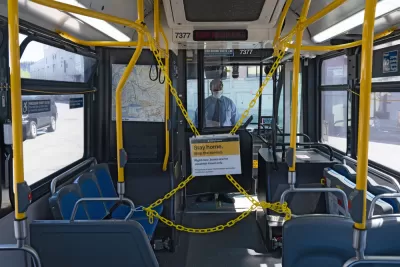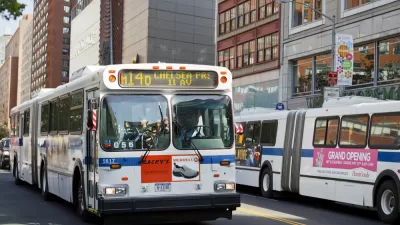Assuming that Congress isn't going to act, does New York Gov Cuomo have the political will to save the New York MTA from sweeping layoffs and service cuts?

Last week, officials with the New York MTA announced a grim projected budget that would cut transit service by 40 percent and layoff more than 9,000 employees.
The announcement of those planned cuts was clearly designed to pressure Congress into approving a new round of stimulus spending to bail transit systems, including the New York MTA, out of a fiscal crisis caused by a sudden and steep drop in ridership during the pandemic.
The threat of long-term damage to the nation's public transit systems is real, even if Congress seems unwilling to act, and transit systems like the MTA might need a backup plan. In the case of the New York MTA, the Democratic governor of the state, with authority over the city's transit system, also seems so far uninspired to deploy the political will at his disposal.
State Senator Jessica Ramos is among the state's elected officials pushing for a state-level solution to the MTA's fiscal crisis, and waiting for Cuomo to get on board, according to an article by Dave Colon.
"Ramos and her Albany colleagues have spent the pandemic proposing multiple new taxes to help deal with New York State’s yawning four-year deficit, which has hit $63 billion by now," writes Colon. "In addition to Ramos’s proposed mark-to-market tax, which would tax an increase in stocks and bonds held by billionaires in New York, Democrats have proposed a pied-a-terre tax, a stock transfer tax, a sales tax on luxury items like private jets or yachts or a surcharge on non-essential online deliveries."
As of the most recent MTA Board meeting, the transit agency is still without a backup plan for a potential future that does not include Congressional support for the agency's sagging finances.
FULL STORY: As the MTA Waits (And Waits) for Washington Relief, More People Are Looking to Cuomo to Save Transit

Maui's Vacation Rental Debate Turns Ugly
Verbal attacks, misinformation campaigns and fistfights plague a high-stakes debate to convert thousands of vacation rentals into long-term housing.

Planetizen Federal Action Tracker
A weekly monitor of how Trump’s orders and actions are impacting planners and planning in America.

In Urban Planning, AI Prompting Could be the New Design Thinking
Creativity has long been key to great urban design. What if we see AI as our new creative partner?

King County Supportive Housing Program Offers Hope for Unhoused Residents
The county is taking a ‘Housing First’ approach that prioritizes getting people into housing, then offering wraparound supportive services.

Researchers Use AI to Get Clearer Picture of US Housing
Analysts are using artificial intelligence to supercharge their research by allowing them to comb through data faster. Though these AI tools can be error prone, they save time and housing researchers are optimistic about the future.

Making Shared Micromobility More Inclusive
Cities and shared mobility system operators can do more to include people with disabilities in planning and operations, per a new report.
Urban Design for Planners 1: Software Tools
This six-course series explores essential urban design concepts using open source software and equips planners with the tools they need to participate fully in the urban design process.
Planning for Universal Design
Learn the tools for implementing Universal Design in planning regulations.
planning NEXT
Appalachian Highlands Housing Partners
Mpact (founded as Rail~Volution)
City of Camden Redevelopment Agency
City of Astoria
City of Portland
City of Laramie




























